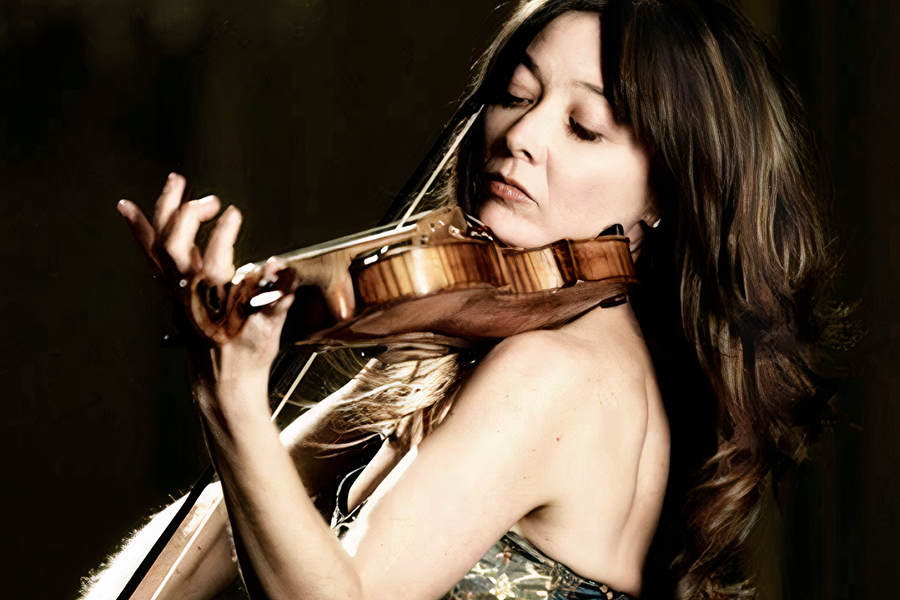
Music / Musica Alchemica. At Llewellyn Hall, November 9. Reviewed by THAYER PREECE.
Baroque music has always been popular, but recently the centuries-old genre has been particularly in demand.
Whether musicians and audiences are enjoying historically-informed performances using period-accurate instruments or modern interpretations of these traditional works, concert halls are brimming with the sounds of the 1600s.
The most recent of these baroque performances to grace Canberra’s stages was a Musica Viva concert featuring European baroque specialists Musica Alchemica. Led by virtuoso Spanish violinist Lina Tur Bonet, this quartet of musicians included cellist Marco Testori, archlute player Giangiacomo Pinardi, and harpsichordist Kenneth Weiss. Each of the four musicians has a truly impressive record of performance, recording, and teaching credits to their name.
Like many baroque specialists, Musica Alchemica presents historically-informed performances. In addition to playing works in a baroque style, the performers’ instruments are engineered to try and replicate those used in the Baroque era. Features such as gut strings create a quality of sound similar to that produced by musicians centuries ago. These period-accurate instruments can present challenges to modern musicians though, reflected here by the ensemble’s frequent tuning breaks and slight lack of projection compared to modern instruments.
Baroque music, like jazz, provides musicians with opportunities to place their own mark on the pieces they are playing. Baroque compositions often expect performers to add spontaneous ornamentation and improvisations on top of the melodic and harmonic lines created by the composer.
Tur Bonet contributed most of these embellishments on violin, but each performer had opportunities to express their interpretation of the works in the program, which ranged from the first known violin sonata, by Giovanni Paolo Cima, to Arcangelo Corelli’s famous variations on the Iberian melody La Folia.
During the performance, each musician was able to highlight the beauty of their individual instrument. Testori, on baroque cello, provided a warmth of tone that resonated through the hall in his rendition of a Telemann sonata for cello. Pinardi, playing an instrument more often seen in museums than concert stages, the archlute, particularly shone in his rendition of a Toccata by Alessandro Piccinini. Weiss bound the ensemble together with his harmonies and intricate fingerwork on the harpsichord, showcasing the instrument’s and his own capabilities in a solo Passacaglia by Georg Muffat.
All of the performers played immaculately and contributed to a thoroughly enjoyable concert. The brightest star on stage though was violinist Bonet, whose dynamic performance demanded the audience’s full attention from the moment she dramatically entered from the back of the hall. From sparkling passages of fleeting notes and serpentine ornamentation to lyrical segments dripping with delicate tenderness, Bonet’s virtuosic playing and potent leadership drove the ensemble to match her enthusiasm and vibrancy.
After the program concluded, driven by an enthusiastic audience, the full ensemble returned to stage to play a semi-improvised Fandango, which was one of the highlights of the evening. Unfettered from musical scores, the musicians clearly delighted in their ability to create their own sound, with cellist Testori contributing occasional percussion on his cello, and Bonet dancing between the other musicians as she passed the melody between each player.
Musica Alchemica put on an incredibly engaging and entertaining performance that reinforced why baroque music has retained its popularity for hundreds of years.
Who can be trusted?
In a world of spin and confusion, there’s never been a more important time to support independent journalism in Canberra.
If you trust our work online and want to enforce the power of independent voices, I invite you to make a small contribution.
Every dollar of support is invested back into our journalism to help keep citynews.com.au strong and free.
Thank you,
Ian Meikle, editor





![For graphic designer Tracy Hall, street art is like any artwork, her canvas has been swapped out for fences and plywood, her medium changing from watercolours to spray paint.
A Canberra resident for 13 years, Tracy has been a street and mural artist for the past five.
Her first exploration into grand-scale painting was at the Point Hut toilets in Banks five years ago. “They had just finished doing up the playground area for all the little kids and the words [of graffiti] that were coming up weren’t family friendly,” she says.
“So I ended up drawing this design and I got approval for the artwork.”
Many of Tracy’s time-consuming artworks are free, with thousands of her own dollars put into paint.
@traceofcolourdesigns
To read all about Tracy's fabulous street art, visit our website at citynews.com.au or tap the link in our bio! 🎨🖌
#canberranews #citynews #localstories #canberrastories #Citynews #localnews #canberra #incrediblewomen #journalism #canberracitynews #storiesthatmatter #canberralocals #artist #streetart #streetartist #StreetArtMagic](https://scontent.cdninstagram.com/v/t39.30808-6/490887207_1225841146218103_6160376948971514278_n.jpg?stp=dst-jpg_e35_tt6&_nc_cat=106&ccb=1-7&_nc_sid=18de74&_nc_ohc=1BXnbxXvf_8Q7kNvwGxh1zh&_nc_oc=Adkh3RxuUkrP0SYqfZ05hihf5KR4C5x0esctcQMhxNfh7FjQpPqh6aJiWWGR5JJn29Y&_nc_zt=23&_nc_ht=scontent.cdninstagram.com&edm=ANo9K5cEAAAA&_nc_gid=k12ng9LoDpfm_tD2N-xR_A&oh=00_AfE4kZbO_8z4jeM7xJ_Vtrzvmtq-60r8ShjsZZsu-tE36Q&oe=680E2F14)


Leave a Reply